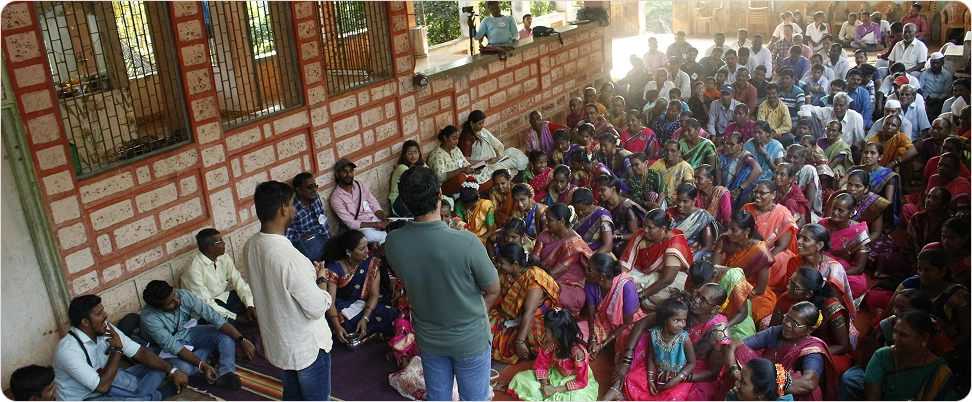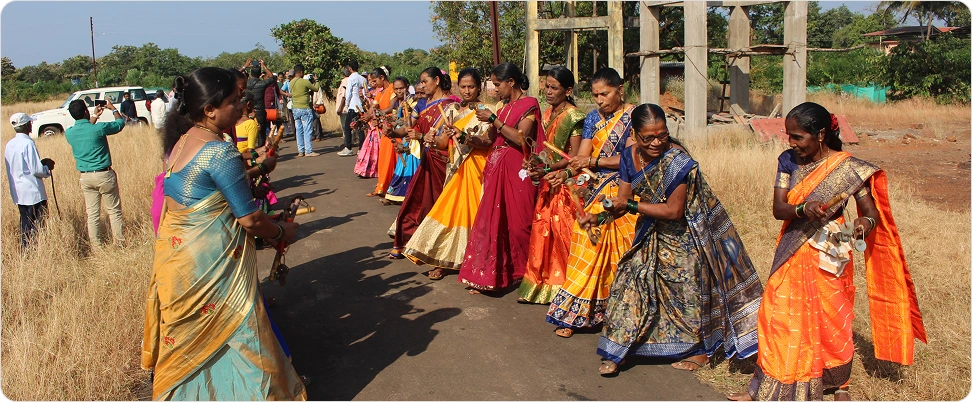From “What’s Missing?” to “What Do You Have?”
The seeds of Gram Swabhimaan were sown during the second wave of COVID-19 in Odisha. But the journey truly began in 2022, as we set out on our first full-fledged yatra — starting from Banswara, Rajasthan.
What did these yatras look like?
A few of us, traveling from village to village, sitting under trees or in courtyards — not with surveys or checklists, but with one simple offering: presence.
Starting With Gratitude
Each meeting began with something people weren’t used to hearing:
“We came here to thank you.”
Often, there was silence.
Villagers asked, “Why would someone from the city travel all the way here to thank us?”
Years of being seen through the lens of scarcity had made them forget their abundance. So we told them:
“Because it’s your labor that builds the roads we came on, the food we eat, and the airports we land in.”
That gratitude changed the room.
Community interaction – Banswara, Rajasthan
The Question That Changed Everything
Then came our next question:
“What do you have?”
This too confused people. For decades, development work — including our own — had often begun by asking what’s lacking.
But we were shifting the frame.
At first, there was hesitation.
Then, a voice: “We have trees.”
Another: “Our trees give us fruit.”
Then: “We have rivers… and our rivers have fish.”
The conversation took flight.
One person completing another’s sentence.
A rhythm. A revelation.
By the end, the room sat taller — visibly aware of all they carried. Skills. Forests. Food. Culture. Memory.
Gram Swabhimaan session – Banswara, Rajasthan, Sep 2022
But Then…
We asked one more question:
“Are you poor?”
And nearly every hand went up.
That moment stays with us.
Because even surrounded by evidence of dignity and resourcefulness, many still believed what the world had told them.
When Alice Spoke
But not every story ended that way.
In one gathering, a woman named Alice stood up and said:
“No, we are not poor.”
She explained how they had elected local leaders, held them accountable, and protected shared resources.
She didn’t ask for validation. She owned her voice.
That day, the idea of Gram Swabhimaan deepened — from recognizing what exists, to reclaiming what’s been denied.
Rethinking What We Call “Educated”
If a farmer can grow 6,000+ rice varieties or graft mangoes to create new hybrids — is he uneducated?
If he pays taxes on every packet of biscuits or soap — is he dependent?
Meanwhile, many of us, educated in subsidised government institutions, never question the imbalance in that label.
From Scarcity to Dignity
These conversations forced us to reflect.
They reminded us that poverty isn’t just an economic condition — it’s a story repeated so often, people begin to believe it.
Gram Swabhimaan is about interrupting that story.
From “what’s missing?” to “what’s already here.”
From dependence to self-reliance.
From label to identity.
Group reflection in Banswara

